Challenge your English with Irregular Verbs Quiz for advanced learners. Includes answers and tips to master verb forms like go/went/gone, see/saw/seen, and more!
Category: Verbs

Difference Between Auxiliary and Main Verbs
Understand the key differences between auxiliary verbs and main verbs in English grammar. This detailed guide explains the roles, functions, and uses of both types of verbs, with clear examples to help you grasp their distinctions and improve your language skills.

Verbs ending with ing
Comprehensive guide on verbs ending with ing. Learn about the formation, usage, and examples of -ing verbs in English grammar. Ideal for students and language learners looking to improve their understanding of continuous tenses and gerunds.

Difference Between Regular and Irregular verbs
This resource explains the difference between regular and irregular verbs in English. Regular verbs follow a set pattern for conjugation in different tenses, while irregular verbs have unique forms that need to be memorized. Understanding this difference is essential for proper verb usage and clear communication in English.

Regular Verbs List
Regular Verbs List: This is a list of regular verbs in English, including their present, past, and future tense forms. Regular verbs are verbs that follow a predictable pattern for conjugation. This list can be a helpful resource for students learning English or for anyone who wants to improve their grammar skills.

Verb Forms V1 V2 V3 V4 V5 List
Verb Forms V1 V2 V3 V4 V5 List. Master the five verb forms (V1, V2, V3, V4, V5) and become a confident user of the English language! Learn the difference between each form, how to use them correctly, and tips to conquer irregular verbs.

Common Verbs Followed by Infinitives in English
Common Verbs Followed by Infinitives in English

To Be Verbs
Unsure about “to be” verbs? Fret no more! Unravel the mysteries of these irregular verbs, conquer common mistakes, and learn how to use them like a pro. To Be Verbs

100+ Sentences of Verbs
Learn to use verbs effectively with 100+ examples of sentences of verbs. This blog post will help you improve your writing and speaking skills by teaching you how to choose the right verb, use the correct verb tense, and use verbs in a variety of ways.
What is Voice in Grammar?
Discover how voice can affect the clarity and effectiveness of your writing. Improve your grammar skills with this in-depth guide to voice.
What is a verb mood?
Learn about the three verb moods in English and how to use them correctly.

Non-finite Verbs: Meaning, Types, and Examples
Non-finite verbs are a key part of the English language. This blog post will explain what non-finite verbs are, how they work, and provide examples.

Finite Verbs: Meaning, Types, and Examples
Finite verbs are a key part of the English language. This blog post will explain what finite verbs are, how they work, and provide examples.

Intransitive Verbs: Meaning, Types, and Examples
Intransitive verbs are a key part of the English language. This blog post will explain what intransitive verbs are, how they work, and provide examples.

Transitive Verbs: Meaning, Types, and Examples
Transitive verbs are a key part of the English language. This blog post will explain what transitive verbs are, how they work, and provide examples.

Irregular Verbs: Meaning, Types, and Examples
Irregular verbs are a challenge for many English learners. This blog post will explain the different types of irregular verbs and provide examples so you can learn how to use them correctly.

Regular Verbs: Meaning, Types, and Examples
Learn about regular verbs, their meaning, types, and examples. This blog post will help you understand how regular verbs work and how to use them in your writing.

Helping Verbs: Meaning, Types, and Examples
Helping Verbs: Meaning, Types, and Examples Verbs play a vital role in sentence construction, expressing actions, states, or occurrences. Among them, helping verbs, also known as auxiliary verbs, assist main verbs in conveying more precise meanings and verb tenses. Understanding helping verbs and their various types is essential for constructing grammatically correct and meaningful sentences. […]

Verb example
Explore the dynamic world of verbs with captivating examples that breathe life into language. From action verbs that propel sentences forward to auxiliary verbs that shape tenses and moods, discover the versatility and power of verbs. Whether you’re a writer seeking to enhance your prose or a language enthusiast fascinated by the intricacies of grammar, these vivid verb examples will inspire and engage. Immerse yourself in the artistry of verbs and unlock the potential to create vibrant, expressive communication.

500 most common verbs in English
Learn the 500 most common verbs in English and improve your fluency and communication skills. This list includes the most essential verbs for everyday communication, and it is a great way to get started on your journey to mastering the English language.
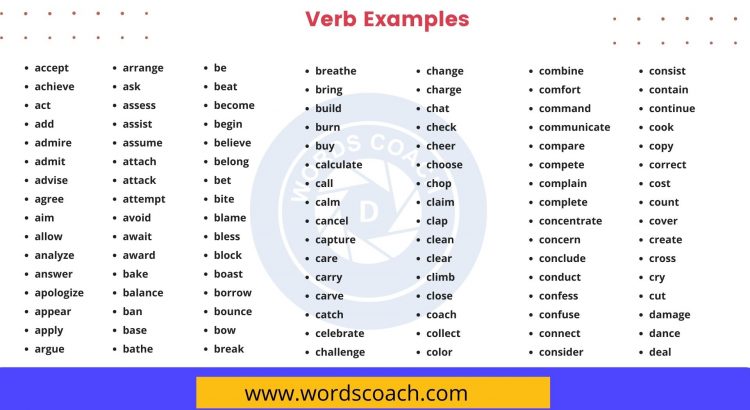
Verb Definition And Verb Examples Sentences
Learn the definition of a verb and see verb examples in sentences. Explore different types of verbs, including action verbs, linking verbs, and helping verbs.
As a part of speech, verbs play a crucial role in constructing sentences. Verbs are action words that show what a subject is doing, what is happening to the subject, or what the state of the subject is. In this blog, you will learn the definition of a verb and see different examples of verbs used in sentences. You will also discover the different types of verbs, including action verbs, linking verbs, and helping verbs.
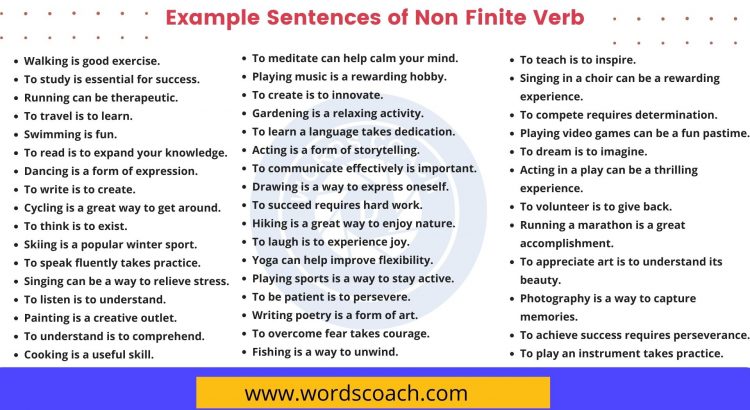
20 Example Sentences of Non Finite Verb
20 Example Sentences of Non Finite Verb
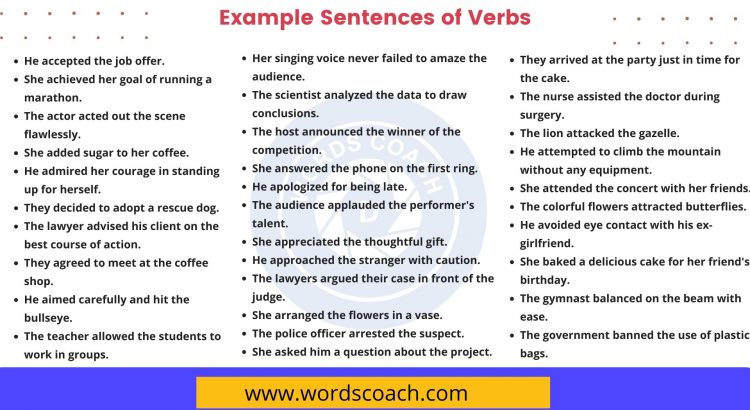
20 Example Sentences of Verbs
20 Example Sentences of Verbs, A verb is one of the most important parts of speech and is a word that is used to describe an action or an ongoing condition. It is considered the heart of a sentence. There is a main verb and sometimes one or more helping verbs.
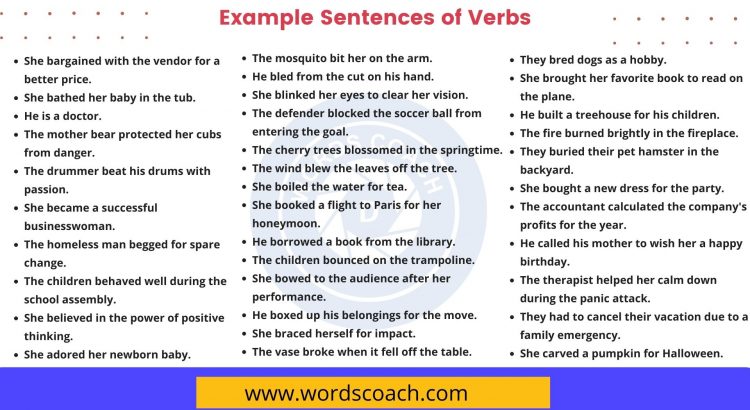
50 Example Sentences of Verbs
50 Example Sentences of Verbs, The verbs that do refer to literal actions are known as action verbs.
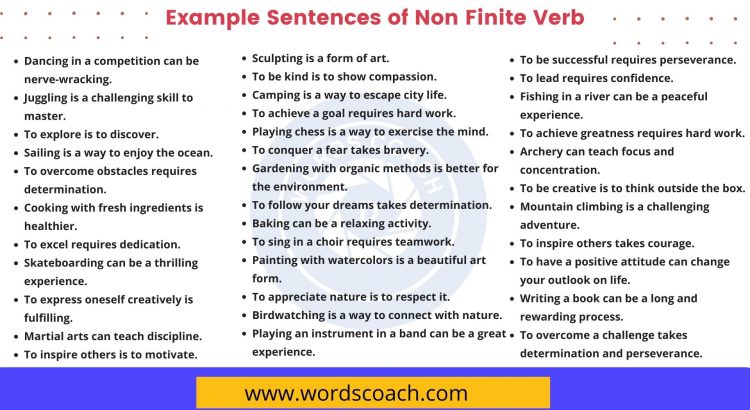
50 Example Sentences of Non Finite Verb
Here are 50 Example Sentences of Non Finite Verb:
